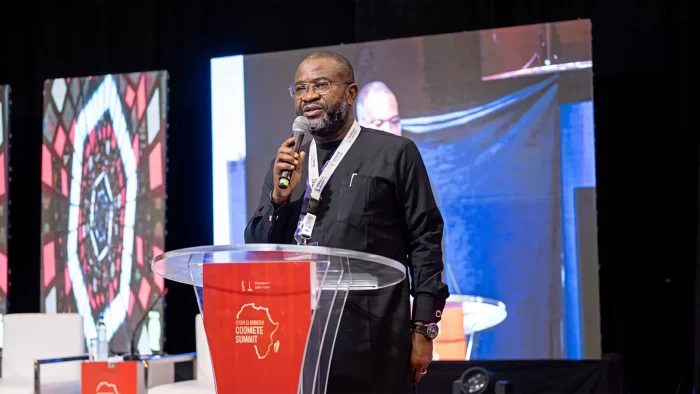
Juliet Ehimuan, a technology executive, social entrepreneur and founder of Beyond Limits Africa, last month stepped down from her role as Director at Google West Africa, where she spent 12 years and got the credit for creating some billion-dollar Nigerian firms known in the tech space as Unicorns. Fielding questions from TOPE TEMPLER OLAIYA, she spoke on the gains and pains of the African tech ecosystem and her next move.
What changes have occurred in the digital ecosystem over the last 12 years when you served as West Africa Director for Google?
[ad]
Over the last 12 years while I was serving as West Africa Director for Google, the digital ecosystem has undergone a remarkable transformation. Several key changes have shaped the landscape, leading to phenomenal growth in access, content, and capabilities. Allow me to highlight the six major developments that I believe to have been instrumental in driving this evolution. These are growth in access, market evolution, increased organisation of the technology ecosystem, significant capacity development, the increasing monetisation of content, and an increase in funding and investments for local startups.
If you consider the first point, which is around access, there has been tremendous growth in access with Internet users in Africa growing from about 10 per cent in 2011 when I started at Google to about 40 per cent now. This has been fueled by increased infrastructure development, and declining costs of data and devices.
In Nigeria, for instance, companies like MainOne, IPNX and others have been doing remarkable work in the infrastructure space. We are also starting to see new players like Elon Musk’s Starlink entering into the market. The nearly 4X growth in access over the last decade is phenomenal, and I believe this trend will only continue.
The tech market has also evolved from being primarily focused on e-commerce a decade ago around companies like Konga and Jumia, to a more diverse marketplace with major plays in various sectors. Fintech, ed-tech, Agritech, logistics, and transport – with companies like Bolt and Uber, have emerged as strong areas of innovation, catering to the needs of consumers and businesses across the nation.
There has also been a remarkable level of growth in capacity. The area of capacity development has been a major priority for companies like Google and businesses like Andela. Without providing people with the basic skills needed to navigate the digital marketplace, then it won’t function effectively. Providing training and up-skilling opportunities to young talents has been instrumental in building a skilled workforce and driving innovation in the tech sector.
There has also been a remarkable boost in the monetisation of content. Content creators in Nigeria in particular have benefited greatly from the digital revolution. Platforms like YouTube and social media have offered opportunities for musicians, filmmakers, and other creatives to reach large audiences and monetize their content, revolutionising the entertainment industry. The Nigerian YouTuber with the most subscribers brought in $4 million in 2022.
Perhaps one of the most significant shifts has been the increasing interest from investors in the African tech scene, particularly the Nigerian tech space. Foreign direct investments in the tech sector have been on the rise, even when other sectors experienced a decline. This influx of funding indicates a growing recognition of the immense potential and opportunities that the Nigerian tech ecosystem offers.
As a result of these transformative changes, Nigeria has seen remarkable progress. From having no tech unicorns 12 years ago, we now have four of the seven technology unicorns in Africa, and the number is set to grow steadily. The tech ecosystem has matured and is now recognized as a driving force behind economic growth and development in Nigeria and across the continent. The future looks bright as we continue to leverage technology to address local challenges, empower our youth, and unlock Africa’s full potential in the digital age.
Nigeria has been recognised as a hotspot for tech startups and entrepreneurial talent. From your perspective, what are some key factors that have contributed to the growth and success of Nigerian startups?
That’s a question that I get asked all the time! I believe the growth of Nigerian startups is driven by a number of factors that include the entrepreneurial spirit of Nigerians, rapid adoption of mobile technology across all strata of society, vastness of the Nigerian market and, therefore, its attractiveness to investors, and finally the presence of a supportive ecosystem.
[ad]
Nigerians possess a strong entrepreneurial drive and resilience, contributing to the creation of startups that address local challenges and market needs. I think it also helps that Nigeria and indeed much of Africa has a predominantly young, and in many cases, tech-savvy urban population. This provides a large talent pool and customer base for startups.
The widespread adoption of mobile technology has greatly expanded access to the digital marketplace. The adoption rates are stunning, and this has allowed startups to reach a broader audience and deliver innovative solutions.
There has also been increased interest from local and international investors, venture capital firms, and angel investors, which has provided startups with funding to scale operations and attract top talent.
To nurture Nigeria’s vibrant startup culture, I am of the view that some steps can be taken. There is need for improve access to finance. We need to establish more early-stage funding options, investment incentives, and public-private partnerships to enhance access to finance for startups. Also, we have to continue to invest in skills development and education. There has to be continuous and increased investment in technical and entrepreneurial education to bridge the skills gap and equip aspiring entrepreneurs. We must streamline regulations and create a business-friendly environment with clear policies, simplified registration processes, and tax incentives to encourage innovation and attract investors.
We must also expand access. We need more investments in digital infrastructure in areas like enhancements to broadband connectivity and provision of reliable power supply. There is the need to continue to foster collaboration and networking among startups, established industry players, and government agencies through events, conferences, and networking platforms.
Connectivity and access to the Internet are essential for digital inclusion and economic growth. In your opinion, what are the main challenges hindering widespread Internet access in Nigeria, and what can be done to bridge the digital divide?
Your framing is absolutely correct – connectivity and access to the Internet are vital for digital inclusion and economic growth. In my view, there are four major issues that have hindered widespread Internet access. These are infrastructure gaps, high data costs, low levels of digital literacy and a lack of sufficient collaboration amongst stakeholders. Nigeria faces infrastructure gaps, particularly in rural areas, where the lack of broadband connectivity and reliable power supply limit Internet access. Addressing these gaps requires significant investment in expanding broadband infrastructure, deploying last-mile connectivity solutions, and improving electricity infrastructure.
Data costs can be prohibitively high for many Nigerians, making Internet access unaffordable for a significant portion of the population. High data costs can be attributed to several factors, including limited competition among telecom providers, infrastructure maintenance costs, and regulatory fees. To address this challenge, measures can be taken to promote competition, streamline regulations, and regulate data pricing.
[ad]
The Nigerian Communications Commission (NCC) has implemented initiatives to drive down data prices, such as the Data Price Floor directive, which prevents telecom providers from offering excessively high data tariffs.
Limited digital literacy skills and awareness pose barriers to Internet adoption and utilisation. Many Nigerians, particularly in rural areas, lack the necessary knowledge and skills to effectively use digital technologies. Expanding digital literacy programmes and initiatives is crucial to bridging the digital divide. Educational institutions, government agencies, and non-profit organisations can collaborate to develop comprehensive digital skills training programmes that reach both urban and rural populations. For example, the Digital Literacy for Girls Initiative in Nigeria provides computer literacy training and coding skills to young girls, empowering them to embrace technology and its opportunities.
By leveraging public-private partnerships and implementing targeted policies, Nigeria can bridge the digital divide and unlock the full potential of its digital economy, driving inclusive growth and socio-economic development.
Funding and investment are crucial for the growth of the tech ecosystem. What are the existing funding opportunities and support mechanisms available to Nigerian startups?
Funding and investment are like the lifeblood of any thriving tech ecosystem. In Nigeria, we’ve witnessed some remarkable growth in the availability of funding opportunities and support mechanisms for startups, enabling tech entrepreneurs to turn their innovative ideas into reality. There are usually four major sources of funding for startup ventures and all of these are present in the Nigerian landscape to some degree. These include venture capital firms, angel investors, grants and impact funds, and government directed investments.
Venture capital firms have played a crucial role in nurturing early-stage startups and fueling high-growth ventures. Notable firms like Ventures Platform, GreenHouse Capital, and Voltron Capital have been instrumental in providing not only financial backing but also mentorship and strategic guidance to promising startups.
[ad]
Angel investors, those visionary individuals with a passion for supporting innovation, have become more active in the Nigerian tech ecosystem. Networks like Lagos Angel Network (LAN) and Ventures Platform Angels have facilitated connections between startups and these experienced investors, providing both capital and valuable insights.
Impact funds focuses on businesses that generate both financial returns and social or environmental impact, it has been making a meaningful difference in the tech space. The Impact Investors Foundation (IIF), Acumen Fund, and All On are among the organisations that have been supporting startups with a mission to address societal challenges. I’ll also include grant-making organisations in this group. Grant providers provide non-equity funds to help startups grow without concerns about dilution in ownership. I lead an organisation called Beyond Limits that has been active in the grants space.
The Nigerian government has also recognized the importance of supporting startups and promoting entrepreneurship. Initiatives like the National Social Investment Programme (NSIP) and the Bank of Industry’s Youth Entrepreneurship Support (YES) Programme have been instrumental in providing financial assistance and other resources to young entrepreneurs, including those in the tech sector.
On how the government and private sector can come together to ensure a thriving investment landscape, I think there are three things that need to be done. First, we must make Nigeria a welcome destination for foreign direct investments. The government should continue to provide incentives to VC firms, angel investors and others who want to invest in Nigerian technology businesses by making it easy to do business in Nigeria, assuring these investors of the ability to repatriate funds, and the provision of tax incentives and other benefits.
Secondly, there is need for more networking and collaboration. These collaborations can be targeted at raising the profile of the Nigerian technology space and can include non-competing activities like staging conferences, training workshops and networking events that allow those with an interest in the Nigerian tech space to engage with a broad swathe of industry players.
[ad]
Finally, we need to nurture and create more incubation spaces and technology hubs. The presence of technology parks, incubators, and accelerators like the Co-Creation Hub (CcHUB) and the Tony Elumelu Foundation Entrepreneurship Programme has been instrumental in providing startups with essential resources, mentorship, and access to a supportive community.
There’s a dance that has to happen between funding, support, collaboration, and innovation. By leveraging these opportunities and fostering a strong partnership between the government and the private sector, we can create a thriving investment landscape that fuels the growth of tech startups and positions Nigeria as a hub for innovation and entrepreneurship in Africa.
As you transition to a broader role within the African tech ecosystem, what are your aspirations and goals for the future? How do you plan to leverage your experience and expertise to further drive digital transformation and innovation across the continent?
With over two decades of experience leading tech organisations and driving the expansion of markets and infrastructure, I understand the immense potential of technology. I am committed to continuing my work in the tech ecosystem, particularly in supporting tech entrepreneurs and businesses.
One of my primary goals is to support and nurture the next generation of tech entrepreneurs. I firmly believe that the future of the African tech ecosystem relies on the success of these budding entrepreneurs. By providing them with mentorship, guidance, and access to resources, I aim to help them build sustainable businesses and become visionary leaders in their respective fields. Through initiatives such as incubator programmes, accelerator partnerships, and mentorship networks, I will work towards cultivating a thriving ecosystem that supports the growth and development of these entrepreneurs.
I am passionate about leadership and excellence. I understand the importance of empowering individuals to reach their full potential. In addition to supporting entrepreneurs, I will extend my efforts to corporate governance, training programmes, and supporting initiatives that focus on unlocking leadership potential and fostering excellence within organisations. Through initiatives like my “30 Days of Excellence” programme and executive coaching services, I will help leaders enhance their skills, drive innovation, and create environments that foster growth and excellence.
By focusing on these three pillars—supporting tech entrepreneurs, leadership and excellence development, and strategic partnerships—I aim to make a significant impact on the African tech ecosystem along with other players in the space.
[ad]








